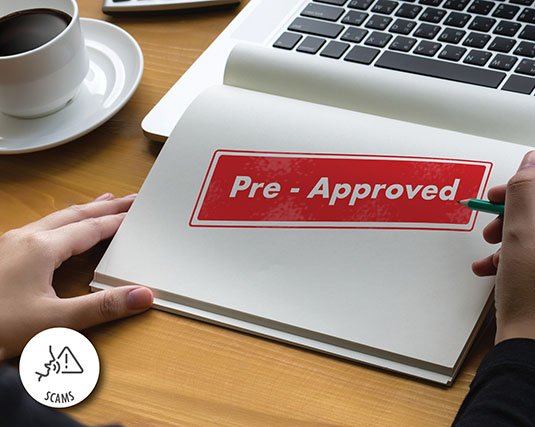Don't Get Caught in a Preapproval Scam

You’ve got mail! But beware, because this particular missive telling you that you’ve been preapproved for a large loan – maybe even a mortgage – may not be as it seems! The exciting news may be accompanied by a check that’s made out to you and even for the full loan amount! It’s a dream come true. Until, of course, it all turns into a living nightmare.
Here’s what you need to know about preapproval scams and how to stay safe.
How the scams play out
In a preapproval scam, a target receives a letter in the mail, an email or a text message informing them they’re preapproved, or “prescreened,” for a large loan. The letter is often accompanied by a live check, or an unsolicited check that can be cashed in by the named recipient – which is you. The letter may also be highly relevant to your life. For example, if you’re in the market for a new home, the offer may feature an alleged preapproved mortgage loan. If you’re looking for a new set of wheels, the letter will likely offer a bogus auto loan. More commonly, though, will be the offer of a personal, or unsecured loan, through a live check.
When you go ahead and cash that check, you may be playing right into the hands of a scammer.
The authentic-looking check cannot be cashed unless the recipient shares their personal information. Of course, this means providing a scammer, or a scam ring, with all the info they need to empty your accounts, commit identity theft or worse. In addition, the check may appear to clear but then bounce a few days later, leaving you to pick up the tab for any of the money you’ve spent. Finally, if you really do need to take out a large loan, the bogus offer can set you back significantly by hurting your credit score.
Checklist for legitimate preapproval offers
If you have a credit history, you’ve likely received these preapproval offers at least several times. Some of them are actually legitimate offers to cover a loan for a large amount. How, then, can you tell which of these offers are legitimate or scam?
First, it’s important to know that, while some of these offers may be legit, that doesn’t mean they’re good for your financial health. If you cash that check and/or accept that loan offer, you’ll be bound by the loan terms, which you may not be truly aware of until the first repayment bill becomes due. Most of these preapproval offers will have exorbitant interest rates and may demand full repayment quicker than typical loans obtained from a bank or credit union.
Now, let’s take a look at how you can determine whether one of these preapproval offers is legit. If you receive an offer as described, look for this information to verify the authenticity of the offer:
- A disclosure of the loan fees
- The annual percentage rate (APR), which is the annual cost of the loan
- The payment schedule
- The loan agreement
- A privacy notice about the sharing of your personal information
- An opt-out notice for future offers
- Contact information for the sender, which includes a number and street address
If any of this info is missing from the preapproval offer, you’re likely looking at a scam.
If you've been targeted
If you’ve been targeted by a preapproval scam or a legitimate but shady offer, there are steps you can take to protect yourself from further harm and to stop the annoying letters from landing in your mailbox.
Let the Federal Trade Commission (FTC) know about the circulating scam. Keep your online interactions safe from scams by using the strongest and most up-to-date security settings across your devices and being careful about the information you share online.
Preapproval scams can be super-annoying and destructive, but you can outsmart them. Stay safe!
